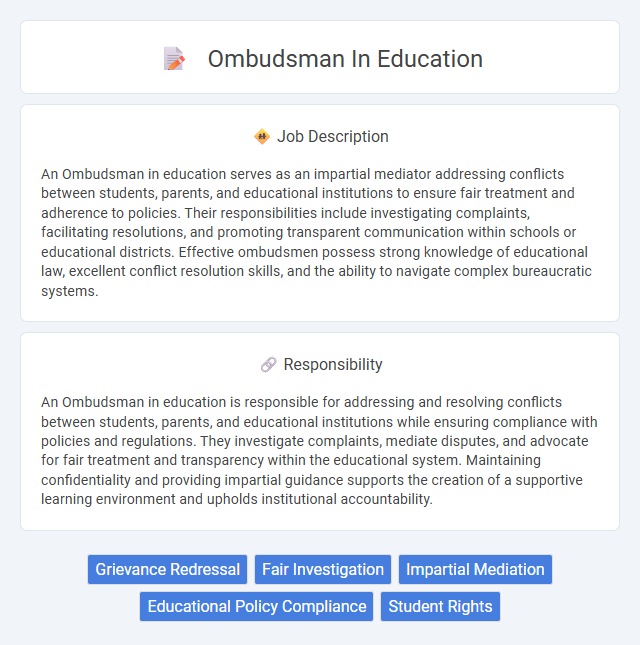
An Ombudsman in education serves as an impartial mediator addressing conflicts between students, parents, and educational institutions to ensure fair treatment and adherence to policies. Their responsibilities include investigating complaints, facilitating resolutions, and promoting transparent communication within schools or educational districts. Effective ombudsmen possess strong knowledge of educational law, excellent conflict resolution skills, and the ability to navigate complex bureaucratic systems.
Individuals with strong communication skills and a patient, empathetic nature will likely be well-suited for an Ombudsman role in education. Those comfortable handling sensitive issues and resolving conflicts may find this job aligns with their abilities and temperament. People who prefer structured environments with clear protocols might struggle, as this position often requires adaptability and problem-solving in complex, multifaceted situations.
Qualification
An Ombudsman in education typically requires a minimum of a bachelor's degree in education, law, or public administration, with many positions preferring a master's degree or higher in related fields such as educational leadership or conflict resolution. Candidates should possess strong communication skills, in-depth knowledge of educational policies, and experience in mediation or dispute resolution to effectively address grievances and improve institutional transparency. Professional certifications in mediation or ombudsman training enhance qualifications and demonstrate a commitment to ethical standards and impartiality in educational dispute management.
Responsibility
An Ombudsman in education is responsible for addressing and resolving conflicts between students, parents, and educational institutions while ensuring compliance with policies and regulations. They investigate complaints, mediate disputes, and advocate for fair treatment and transparency within the educational system. Maintaining confidentiality and providing impartial guidance supports the creation of a supportive learning environment and upholds institutional accountability.
Benefit
The role of an Ombudsman in education likely benefits students, parents, and staff by providing an impartial resource for resolving conflicts and addressing concerns without fear of retaliation. This position may improve transparency and trust within educational institutions, promoting a fair and supportive learning environment. Increased communication facilitated by an Ombudsman could lead to better policies and a more inclusive school culture.
Challenge
The ombudsman in education likely faces challenges related to addressing complex conflicts between students, faculty, and administration while maintaining neutrality. There is a probability of encountering resistance when advocating for policy changes or promoting transparency within educational institutions. Navigating confidentiality issues and ensuring trust from all parties involved may also present ongoing difficulties.
Career Advancement
An Ombudsman in education specializes in resolving conflicts and improving communication between students, faculty, and administration, fostering a fair and transparent academic environment. Career advancement in this role often involves gaining expertise in conflict resolution, educational policy, and administrative law, leading to senior positions such as Director of Student Affairs or Higher Education Compliance Officer. Building strong networks within educational institutions and pursuing advanced degrees in mediation or education law can significantly enhance opportunities for leadership roles.
Key Terms
Grievance Redressal
The Ombudsman in education serves as a critical authority for grievance redressal, ensuring fair and impartial resolution of complaints related to academic policies, staff behavior, and administrative decisions. This role involves investigating disputes between students, parents, and educational institutions, promoting transparency and accountability within schools and universities. Effective grievance redressal by the Ombudsman helps maintain trust, fosters a positive learning environment, and upholds students' rights.
Fair Investigation
An Ombudsman in education ensures fair investigation by impartially examining complaints and disputes involving students, faculty, and administration. This role prioritizes confidentiality, transparency, and adherence to institutional policies to resolve conflicts equitably. Effective Ombudsman interventions promote trust, uphold educational standards, and foster a just academic environment.
Impartial Mediation
The Ombudsman in education serves as an impartial mediator, addressing conflicts between students, parents, and educational institutions to ensure fair resolution. By facilitating open dialogue and understanding, the Ombudsman promotes transparency and accountability within the education system. Their role is crucial in safeguarding the rights of all stakeholders while maintaining a balanced, unbiased perspective.
Educational Policy Compliance
The Ombudsman in education plays a critical role in ensuring compliance with educational policies by addressing grievances and mediating conflicts between students, staff, and administration. This position involves monitoring adherence to federal and state regulations, school district guidelines, and institutional policies to guarantee equitable practices. Effective oversight facilitates transparency, accountability, and the protection of educational rights within the academic community.
Student Rights
An Ombudsman in education serves as a neutral advocate ensuring the protection and enforcement of student rights within academic institutions. Responsibilities include addressing student grievances, mediating conflicts, and promoting fair policies that uphold confidentiality and equity across all educational levels. By monitoring compliance with educational laws and institutional regulations, the Ombudsman fosters a safe and supportive learning environment where student concerns are heard and resolved effectively.
 kuljobs.com
kuljobs.com